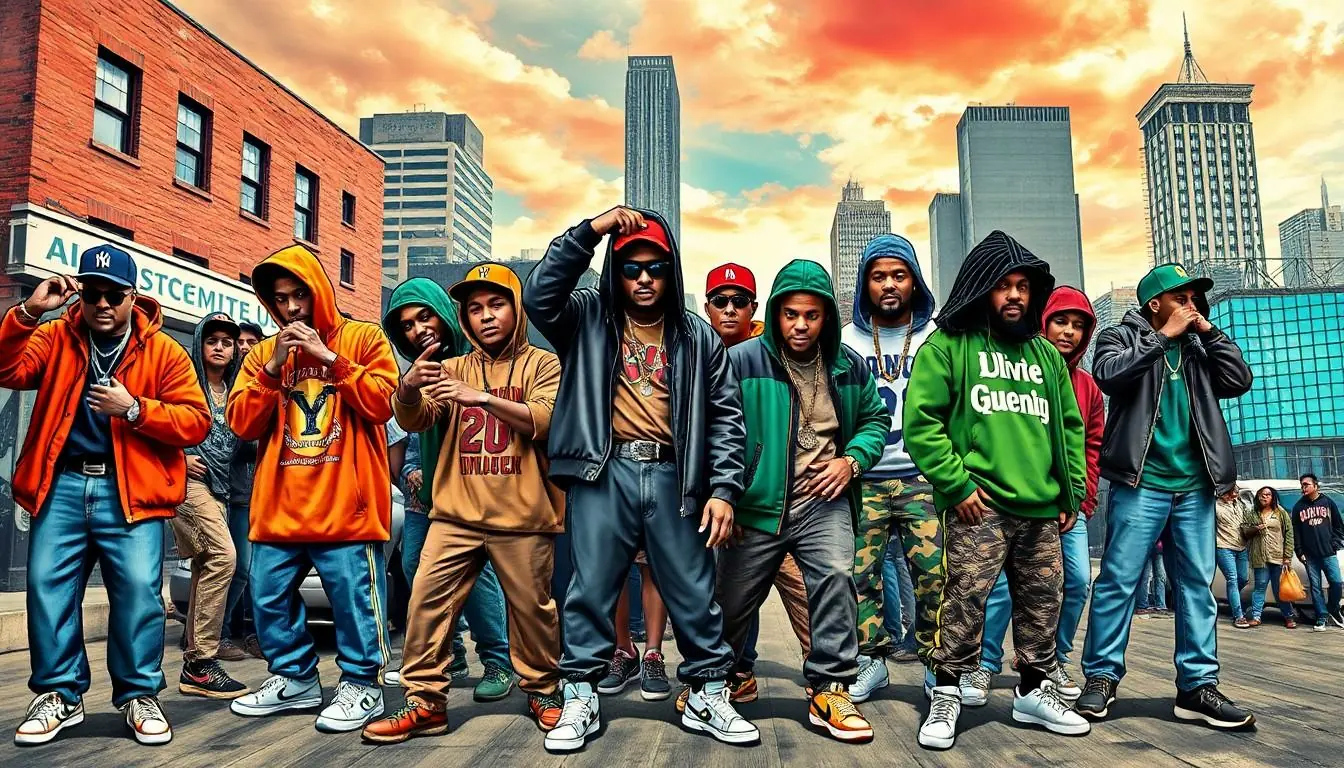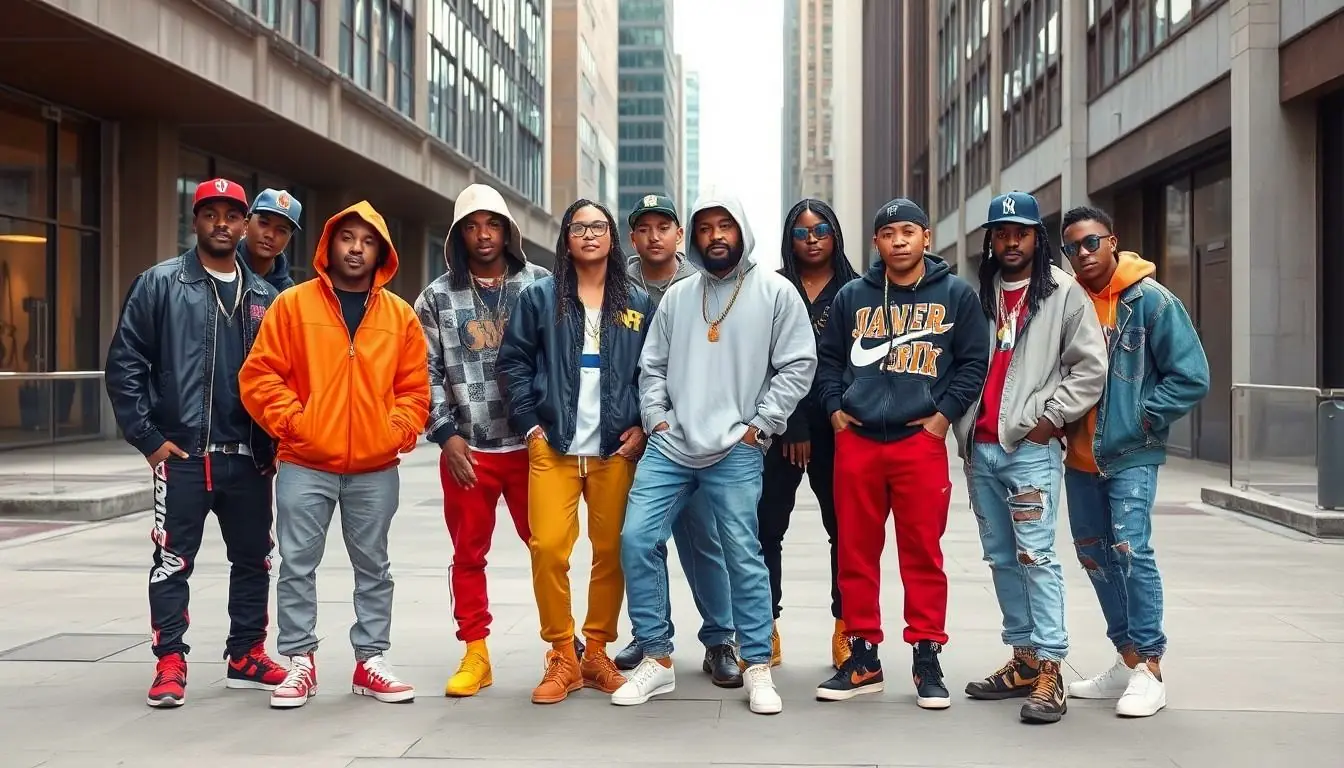The 2000s were a wild ride in the hip hop scene, where beats dropped harder than a clumsy dancer at a wedding. This era birthed some of the most iconic groups that not only shaped the genre but also transformed the cultural landscape. From catchy hooks to unforgettable collaborations, these groups had everyone nodding their heads and spitting rhymes on the playground.
Table of Contents
ToggleOverview of Hip Hop Groups 2000s
The 2000s marked a transformative era for hip hop groups, showcasing diverse styles and innovative approaches. Iconic ensembles such as OutKast, The Black Eyed Peas, and Wu-Tang Clan emerged, each redefining elements of hip hop music. OutKast blended genres, producing hits like “Hey Ya!” that crossed over into mainstream pop. Their unique sounds influenced countless artists and captivated audiences.
Collaborative works became a defining feature of this decade. The Black Eyed Peas introduced infectious tracks that combined hip hop with pop and dance music, pushing boundaries and gaining widespread acclaim. Wu-Tang Clan maintained their gritty lyrical style, emphasizing street narratives and cultural authenticity while inspiring future generations.
Other groups like Dipset and G-Unit contributed to the rise of gangsta rap, emphasizing lifestyle and regional identity. Dipset, known for their fashion-forward image and distinctive sound, garnered a dedicated following. G-Unit’s impact stemmed from their gritty lyrics and collaborations with major artists.
Noteworthy trends emerged during this period. The use of sampling in production became prevalent, with groups incorporating elements from funk, soul, and rock genres. This creativity helped bridge gaps between different musical styles, resulting in a richer sound.
Emerging artists frequently formed alliances with established groups, fostering a sense of community within hip hop. These relationships cultivated a vibrant scene, enabling cross-genre collaborations. Together, they created numerous chart-topping hits that resonated with audiences worldwide.
The influence of 2000s hip hop groups persists, reflecting their legacy in today’s music landscape. Iconic collaborations and innovative approaches laid the groundwork for contemporary artists, proving that the essence of this era continues to thrive.
Major Players in the Scene

The 2000s hip hop scene showcased influential groups shaping the genre’s evolution. Their distinct styles and innovative sounds contributed significantly to hip hop’s cultural landscape.
East Coast Hip Hop Groups
East Coast hip hop flourished with groups like The Roots and Dipset. The Roots, known for their live instrumentation, released albums blending jazz and hip hop seamlessly. Dipset, with members like Cam’ron and Jim Jones, emphasized street narratives and flamboyant fashion. Another notable group, G-Unit, helmed by 50 Cent, gained massive popularity and expanded their reach significantly through collaborations. Their lyrical prowess highlighted regional identity and social issues, establishing a solid presence within the hip hop community.
West Coast Hip Hop Groups
West Coast groups like N.W.A and The Black Eyed Peas emerged prominently during this time. N.W.A’s hard-hitting lyrics commanded attention, while The Black Eyed Peas blended genres, appealing to diverse audiences. Their fusion of hip hop with pop and dance elements led to chart-topping hits like “Where Is the Love?” Another influential group, Hieroglyphics, contributed to the alternative hip hop movement, emphasizing intricate wordplay and conscious themes.
Southern Hip Hop Groups
Southern hip hop saw significant growth with groups such as OutKast and Lil Jon & The East Side Boyz. OutKast, with hits like “Hey Ya!” and “Ms. Jackson,” incorporated various musical elements, reshaping perceptions of the genre. Lil Jon & The East Side Boyz popularized crunk music, characterized by high-energy beats and catchy hooks. Additionally, groups like UGK and Three 6 Mafia garnered acclaim for their unique styles, influencing countless emerging artists in the hip hop scene.
Notable Albums and Hits
The 2000s produced several landmark albums and unforgettable singles from hip hop groups. These releases defined the sound of a generation and left a lasting impact on music culture.
Influential Albums
OutKast’s Speakerboxxx/The Love Below, released in 2003, showcased genre-blending and received massive acclaim, earning Grammy Awards for Album of the Year. Wu-Tang Clan’s Iron Flag from 2001 continued their legacy with hard-hitting lyrics and strong collaborations, emphasizing their signature gritty style. The Black Eyed Peas brought mainstream attention to hip hop with Elephunk, featuring innovative production and catchy rhythms, thus elevating their genre. G-Unit’s Beg for Mercy marked a shift in gangsta rap, highlighting themes of loyalty and street life, and achieving multi-platinum status.
Chart-Topping Singles
“Hey Ya!” by OutKast captured the mainstream audience, becoming a cultural phenomenon with its infectious hook and upbeat production. The Black Eyed Peas scored big with “Where Is the Love?” featuring poignant lyrics addressing social issues, resonating with listeners. “Ridin'” by Chamillionaire, featuring Krayzie Bone, topped charts with its catchy chorus and distinctive beat. Wu-Tang’s “Gravel Pit” kept fan loyalty strong, blending their trademark sound with innovative visuals. Each of these tracks contributed to the diverse soundscape of 2000s hip hop.
Cultural Impact of Hip Hop Groups
Hip hop groups of the 2000s left a lasting impact on culture, shifting fashion trends and addressing social issues. Their contributions shaped lifestyles and influenced communities.
Fashion and Lifestyle Influences
Styles from iconic groups permeated streetwear and high fashion. OutKast popularized eclectic clothing, combining vintage with contemporary pieces. The Black Eyed Peas blended urban and pop styles, influencing mainstream fashion through colorful attire and bold accessories. G-Unit introduced a distinctive look with their brand of casual, sporty clothing, creating trends that extended beyond music. Groups like Dipset played a crucial role in popularizing accessories like bandanas and oversized T-shirts. These fashion choices expressed personal identity, resonating with fans and elevating hip hop culture.
Contributions to Social Issues
Hip hop groups acted as platforms for social change, addressing critical issues through their music. Lyrics often confronted poverty, racism, and violence, providing a voice for marginalized communities. Wu-Tang Clan highlighted systemic injustices, prompting conversations around police brutality and economic disparities. The Black Eyed Peas’ track “Where Is the Love?” tackled global issues like discrimination and war, encouraging unity and awareness. OutKast’s imagery and themes frequently explored identity and acceptance, influencing perceptions in society. These powerful messages inspired activism and offered a narrative that extended beyond entertainment.
Legacy and Evolution
The legacy of 2000s hip hop groups resonates through contemporary music. OutKast’s genre-defying sound paved the way for artists blending various styles. Innovative approaches seen in albums like Speakerboxxx/The Love Below shifted perceptions of how hip hop could sound and feel.
Wu-Tang Clan’s gritty narratives highlighted the importance of storytelling within the genre. Their influence on lyrical depth continues to inspire rappers today. Unique group dynamics and chemistry defined the collaborative nature of this era, and artists thrived through partnerships.
Cultural impacts of these groups were profound. Fashion trends evolved as hip hop artists like The Black Eyed Peas fused streetwear with mainstream aesthetics. Expanding their reach, G-Unit popularized distinctive attire that reflected an urban lifestyle. Dipset’s bold accessories further showcased individual expression in fashion.
Social issues found a voice through music during this time. Wu-Tang Clan’s emphasis on systemic challenges brought awareness to social justice. Hits like “Where Is the Love?” by The Black Eyed Peas sparked conversations about global concerns. Music served as a platform for activism, revealing the deeper motivations behind the art.
The 2000s laid the foundation for future hip hop groups. New generations draw inspiration from the pioneering sounds and styles established during this era. Modern artists continue to build on the past while pushing boundaries, ensuring that the legacy of these iconic groups endures.
The 2000s were a pivotal decade for hip hop groups, leaving an indelible mark on the genre and culture. These groups not only shaped musical trends but also influenced fashion and social discourse. Their innovative sounds and powerful messages resonated with fans and inspired future artists.
As hip hop continues to evolve, the legacy of 2000s groups remains evident in today’s music scene. The genre’s rich history of collaboration and genre-blending continues to thrive. The impact of these iconic ensembles ensures that their contributions will be celebrated for years to come, solidifying their place in music history.



